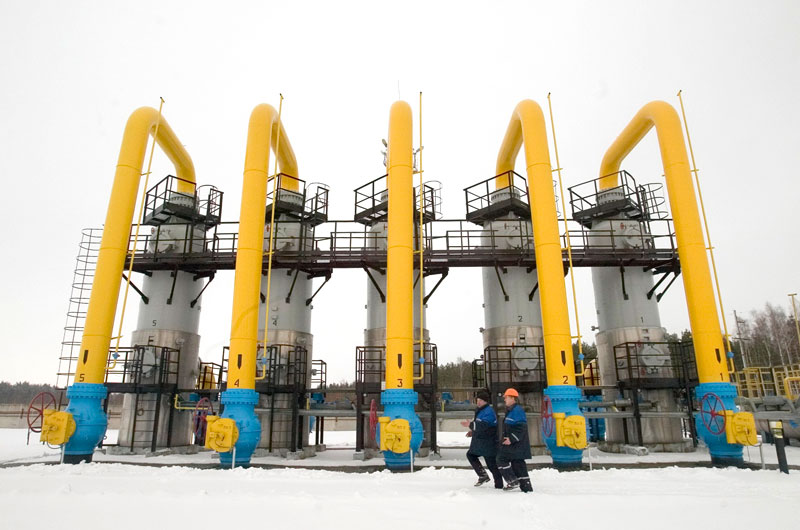
European Union Assists Poland to Rectify Agreement With Gazprom
Publication: Eurasia Daily Monitor Volume: 7 Issue: 178
By:

Poland consumes some 14.5 billion cubic meters (bcm) of gas annually (unaffected by the economic recession elsewhere). The country produces some 4.3 bcm per year internally while importing the remainder from Gazprom (Bloomberg, September 18). Most of Gazprom’s deliveries enter Poland through the Yamal-Europe pipeline, except some 2.5 bcm per year that were being delivered by Gazprom’s offshoot RosUkrEnergo via Ukraine until 2009.
The European Commission has registered significant objections to the Russian-Polish draft agreement on gas supplies and pipeline regime from the standpoint of EU law and policy (see accompanying articles). The EU’s Third Energy Package (2009), oriented towards consumer interests, precludes gas suppliers from operating pipelines (the operator must be independent from the supplier), and requires open competitive access by gas suppliers to pipelines. This anti-monopoly legislation threatens Gazprom’s positions on EU territory, particularly in countries of Central and Southeastern Europe. In Poland’s case, it would change the existing regime of the Yamal (Russia)-Europe pipeline’s section on Polish territory and help diversify the country’s import options.
The EU has weighed in with a detailed letter from Energy Commissioner Guenther Oettinger to the Polish government and an intervention by Oettinger in the European Parliament. This has started a process of consultations, giving Warsaw an opportunity to reconsider the terms of the draft agreement and avoid signing a flawed document with Gazprom. Officials of the European Commission are also holding consultative talks with the Russian side to clarify the EU’s concerns. Meanwhile, the Commission informally encourages European companies to cover (presumably through swap deals) Poland’s looming gas deficit during the months of October to December, so as to allow time for further negotiation.
The goal is to bring the terms of the Russian-Polish gas supply agreement, and the regime of the Yamal-Europe pipeline on Polish territory, into conformity with EU law and supply-diversification policy. This must include full independence of the Polish pipeline operator (Gaz-System) from the supplier (Gazprom), with free access for other suppliers to the pipeline, including a reverse-use option for non-Russian gas supplies to Poland (Gazeta Wyborcza, August 31; New Europe, September 27; Bloomberg, September 18, 28).
The Polish government’s response seems fraught with some ambiguities. The Foreign Affairs Ministry under Radoslaw Sikorski has supported the EU’s approach all along. Prime Minister, Donald Tusk, and Deputy Prime Minister and Economics Minister, Waldemar Pawlak, have sounded surprised, irritated, and occasionally brusque in their public responses to Brussels. Citing derogations from EU law in German deals with Gazprom (e.g., the Nord Stream pipeline exempted from third-party access), they have complained of unequal treatment of Poland by Brussels; thus invoking a bad precedent as if trying to duplicate it in Poland. They also cited Polish national interest to defend the terms drafted with Gazprom, thus seeming to separate Polish interests from EU policy. This notion is reminiscent of Hungary’s former Prime Minister, Ferenc Gyurcsany, pleading national interest and implicitly separating it from EU policy to justify bilateral arrangements with Gazprom.
In September, Tusk and Pawlak repeatedly announced that the agreement would be signed with Gazprom during that same month. This did not happen, however, as the Prime Minister has moved from under-estimating to seriously addressing some of the EU Commission’s concerns. Tusk agrees that Gaz-System should be fully independent from Gazprom, set transit fees, sign contracts with gas suppliers, and allow them access on equal terms. If so, the draft agreement would need to be revised accordingly. Pawlak, the chief Polish negotiator for this agreement, seems to push for an undelayed signing. This may reflect the concerns of some Polish industries, main recipients of Gazprom-delivered gas. Poland’s Oil and Gas Company (PGNIG, state-owned) has issued several public warnings that a gas deficit may cause shortages to Polish corporate users by late October, unless the agreement with Gazprom is signed promptly (Rzeczpospolita, September 22; PAP, September 14, 17, 18, 20, 24; Bloomberg, September 28).
The political context, external and internal, poses additional complications. The Polish government pursues its own “reset” of relations with Russia and seeks to demonstrate that it works. The proposed agreement with Gazprom, however, would suggest that the Polish reset may be irrelevant at best or distracting at worst, as far as energy relations with Russia are concerned. President Bronislaw Komorowski and the government of Donald Tusk (not unlike the Obama administration in Washington) strive to distance themselves from the former president and government regarding Polish-Russian relations. Former president Lech Kaczynski (killed in the Smolensk plane crash earlier this year) and his party had criticized the proposed gas agreement; and the party (currently in the opposition) continues to criticize it, as well as the “reset” policy. Thus, political considerations on either side may affect the debate over the proposed agreement’s terms.
One important assumption behind the Polish reset holds that Poland must no longer be seen as impeding rapprochement between the European Union and Russia. In the case of Poland’s negotiations with Gazprom, a role reversal can be seen. The EU is now recommending caution to the Polish government.




